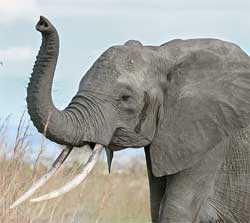






An estimated 22,000 elephants were illegally killed across the continent last year, as poaching reached unacceptably elevated levels, said a joint statement by CITES, TRAFFIC and IUCN.
"If poaching rates are sustained at current levels, Africa is likely to lose a fifth of its elephants in the next ten years," the statement said.
The study was released as experts and ministers met in Botswana to look at ways to stamp out the elephant slaughter, which is fuelled by a growing demand for ivory in Asia.
"We continue to face a critical situation," said John E. Scanlon, secretary general of the Convention on International Trade in Endangered Species of Wild Fauna and Flora (CITES).
"Current elephant poaching in Africa remains far too high, and could soon lead to local extinctions if the killing rates continue," he said.
Scanlon described the situation in central Africa, where the estimated poaching rate is twice the continental average, as "particularly acute".
There are around half a million elephants left in Africa compared with 1.2m in 1980 and 10m in 1900.
Researchers believe that poverty and weak governance in African countries with elephants are the driving forces behind a spike in elephant poaching.
Elephants are killed for their tusks and the ivory is used to make ornaments.
Ivory trade is banned under the CITES, yet illegal ivory trade is estimated to be worth up to US$10bn a year. The price of ivory on the black market shot up tenfold in the past decade to more than US$2,000kg. Experts says that, on average, an adult elephant tusk weighs about 20 kg.
"In the past 13 years, the quantities of ivory traded have steadily shot up," says Tom Milliken, an ivory trade expert with the wildlife monitoring agency TRAFFIC.
"This year has seen a 20% increase over the previous peak year in 2011. We're hugely concerned," said Milliken.
In recent years ivory trafficking routes appear to be shifting from the traditional West and central African seaports to east Africa with Kenya and Tanzania as the exit points. Most of the ivory ends up in Thailand and China.
The group meeting in Botswana is expected to adopt a pact that will commit signatories, including the biggest ivory markets such as China, to demonstrate political will at the highest level to fight poaching and ivory trafficking.
Source: AFP via I-Net Bridge

For more than two decades, I-Net Bridge has been one of South Africa’s preferred electronic providers of innovative solutions, data of the highest calibre, reliable platforms and excellent supporting systems. Our products include workstations, web applications and data feeds packaged with in-depth news and powerful analytical tools empowering clients to make meaningful decisions.
We pride ourselves on our wide variety of in-house skills, encompassing multiple platforms and applications. These skills enable us to not only function as a first class facility, but also design, implement and support all our client needs at a level that confirms I-Net Bridge a leader in its field.
Go to: http://www.inet.co.za